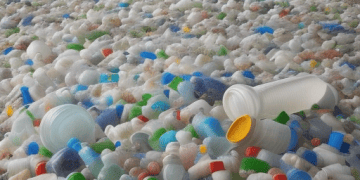A recent report by the Swiss non-profit organization EA Earth Action has revealed significant challenges in plastic waste management across various countries, with Eritrea identified as having the poorest management practices worldwide. According to the 2024 Plastic Overshoot Day (POD) Report, approximately 97% of plastic waste in Eritrea is mismanaged, contributing to severe environmental concerns. The report, which features a Mismanaged Waste Index (MWI), highlights that 42 African nations are struggling with high levels of plastic waste mismanagement, with percentages ranging from 78% to 97%. This issue is prevalent in 13 of the 15 worst-performing countries globally, all located in Africa. Globally, the POD is projected to fall on September 5, 2024, indicating the point at which the world’s capacity to manage plastic waste is surpassed by the volume generated from various sectors including packaging, household, and textiles.
Since 2021, the global POD has gradually extended each year, reflecting minor improvements in waste management but also an increase in overall plastic production. In India, the situation shows signs of improvement, with the country moving from fourth to 95th position in the MWI. India’s current mismanagement rate stands at 68.62%, with an estimated 7.5 million tonnes of its 10.8 million tonnes of produced plastic waste being improperly handled. Conversely, Mozambique showed progress, moving from the highest mismanagement rate in 2023 to the seventh position in 2024. Its POD extended by three days compared to 2021, reflecting slight improvements in managing its plastic waste. The report also points to a 7.1% increase in global plastic waste generation from 2021 to 2024, with an estimated 220,606 kilotonnes expected in 2024.
This increase stresses the urgency of addressing the growing issue of plastic waste management. Key insights from the report include the projection that by April 2024, nearly half of the world’s population will reside in regions where plastic waste exceeds manageable capacities. This underscores the critical need for enhanced recycling and waste management strategies, especially as nations prepare for the fourth round of the United Nations Plastic Treaty negotiations. The upcoming negotiations in Ottawa, Canada, are set to focus on implementing global rules for systemic changes necessary to combat the plastics crisis. The effectiveness of any future plastics treaty will heavily depend on these negotiations and the subsequent adoption and enforcement of agreed-upon measures. Overall, the report categorizes nations into six archetypes based on their plastic waste production levels, management efficiency, and trade patterns, aiming to tailor solutions that address the unique challenges faced by different countries in managing their plastic waste effectively.
Explore the newest supply chain news at The Supply Chain Report. Visit ADAMftd.com for free international trade tools.
#PlasticWaste #EnvironmentalCrisisNews #EritreaNews #EcoFriendly #RecyclingNews















